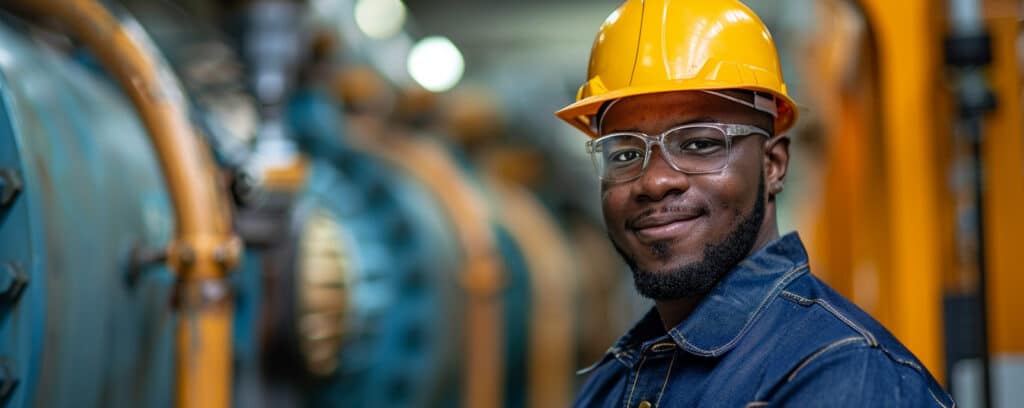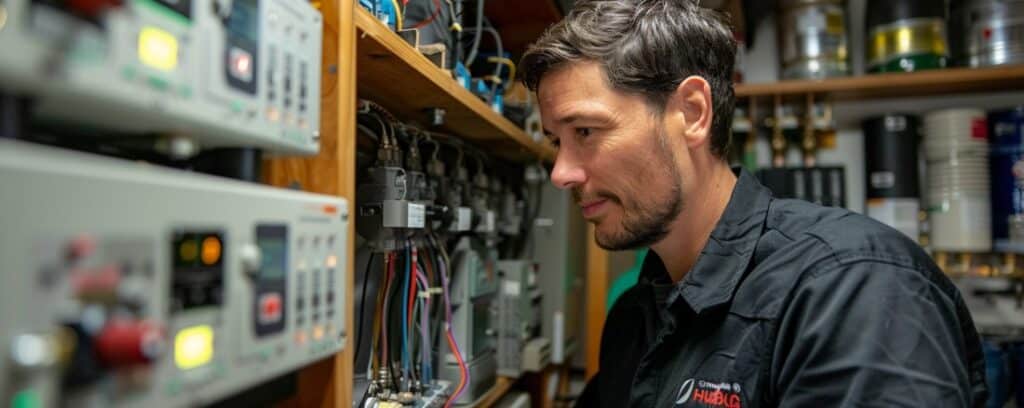- What Does a Facilities Maintenance Technician Do?
- How to Become a Facilities Maintenance Technician
- What You Will Learn in Facilities Maintenance Programs
- Career Opportunities for Facilities Maintenance Technicians
- Job Outlook and Salary for Facilities Maintenance Technicians
- Frequently Asked Questions
- Charting Your Path to a Successful Facilities Maintenance Technician Career
A career as a facilities maintenance technician offers a dynamic and fulfilling path for those interested in maintaining and improving building systems. Facilities maintenance technicians play a crucial role in ensuring the smooth operation of various facilities, including office buildings, schools, hospitals, and factories. These professionals are responsible for a wide range of tasks, from routine maintenance and repairs to complex installations and troubleshooting.
As the demand for well-maintained facilities continues to grow, the need for skilled facilities maintenance technicians is also on the rise. This article provides a comprehensive overview of the facilities maintenance technician role, including the educational path, job responsibilities, potential career opportunities, and salary expectations. Whether you are a prospective student or a current professional seeking to enhance your skills, understanding this career can help you make informed decisions about your future.
What Does a Facilities Maintenance Technician Do?
A facilities maintenance technician is responsible for ensuring that buildings and their systems operate efficiently and safely. This role involves a variety of tasks, including routine maintenance, repairs, and installations of mechanical, electrical, and plumbing systems. Facilities maintenance technicians also handle general building upkeep, such as painting, carpentry, and grounds maintenance. Their duties often include:
- Preventive Maintenance: Regularly inspecting building systems and equipment to ensure they are in good working order and performing routine maintenance tasks to prevent breakdowns.
- Repairs: Troubleshooting and repairing mechanical, electrical, and plumbing issues. This can include fixing HVAC systems, repairing electrical circuits, and addressing plumbing leaks.
- Installation: Installing new equipment and systems, such as HVAC units, lighting fixtures, and plumbing systems. This requires a strong understanding of building codes and safety regulations.
- General Maintenance: Performing a variety of tasks to maintain the building’s appearance and functionality, such as painting, carpentry, and grounds maintenance.
- Safety and Compliance: Ensuring that all building systems comply with local, state, and federal regulations. This includes adhering to safety protocols and maintaining records of inspections and repairs.
Work Environment
Facilities maintenance technicians work in a variety of settings, including:
- Office Buildings: Maintaining HVAC systems, electrical systems, and plumbing in office environments to ensure a comfortable and functional workspace.
- Schools: Keeping educational facilities safe and operational by maintaining heating and cooling systems, electrical systems, and ensuring the general upkeep of the buildings and grounds.
- Hospitals: Ensuring that critical systems such as HVAC, electrical, and plumbing are always operational to support patient care and safety.
- Factories: Maintaining industrial equipment and building systems to support manufacturing processes and ensure a safe working environment.
Key Skills and Qualities
To be successful as a facilities maintenance technician, several key skills and personal qualities are essential:
- Technical Skills: Proficiency in electrical, plumbing, and HVAC systems is crucial. Technicians must be able to diagnose and repair a variety of mechanical issues.
- Problem-Solving Abilities: The ability to quickly identify problems and develop effective solutions is vital in this role.
- Attention to Detail: Ensuring that all maintenance and repairs are performed correctly and safely requires a keen eye for detail.
- Physical Stamina: This job often requires physical labor, including lifting heavy objects, standing for long periods, and working in various environments.
- Communication Skills: Technicians must be able to communicate effectively with building managers, other maintenance staff, and sometimes with tenants or employees.
By understanding the detailed facilities maintenance technician job description and the skills required, aspiring professionals can better prepare themselves for a successful career in this field.
How to Become a Facilities Maintenance Technician
Pre-Professional Training
For those interested in becoming a facilities maintenance technician, preparation can begin in high school. Taking courses in shop, mathematics, science, and technical education can provide a solid foundation. These subjects help develop problem-solving skills and technical knowledge, which are crucial for this career. High school students can also benefit from participating in vocational training programs that offer hands-on experience with tools and basic maintenance tasks.
Post-Secondary Education and Training Options
After high school, aspiring facilities maintenance technicians have several educational and training paths to choose from. These include:
Vocational Schools and Technical Colleges
Vocational schools and technical colleges offer certificate and diploma programs that provide focused training in facilities maintenance. These programs typically last from a few months to a year and cover essential topics such as HVAC systems, electrical work, plumbing, and general building maintenance. Graduates are prepared to enter the workforce with the skills needed for entry-level positions.
Community Colleges
Community colleges offer associate degree programs in facilities maintenance technology or a related field. These programs usually take two years to complete and provide a more comprehensive education. Students receive instruction in a wider range of maintenance topics, along with general education courses that can enhance critical thinking and communication skills. An associate degree can improve job prospects and provide a stepping stone to supervisory roles.
Certification Programs
Certifications can significantly enhance a facilities maintenance technician’s qualifications. Professional organizations, such as the Building Owners and Managers Institute (BOMI) International and the International Facility Management Association (IFMA), offer certification programs that validate a technician’s expertise. Certifications like the Certified Facility Manager (CFM) or the Facilities Management Professional (FMP) can lead to higher earning potential and career advancement.
Training for Current Workers
Current workers in the maintenance field who seek to enhance their skills and increase their earning potential can benefit from additional training and certifications. Many vocational schools and community colleges offer part-time or evening classes to accommodate working professionals. Online courses and certification programs are also available, providing flexible options for continuing education.
By pursuing the appropriate educational path and obtaining relevant certifications, aspiring facilities maintenance technicians can equip themselves with the knowledge and skills needed to succeed in this growing field. Whether starting from scratch or seeking to advance an existing career, there are numerous opportunities for training and development.
What You Will Learn in Facilities Maintenance Programs
Core Subjects and Training
Facilities maintenance programs cover a wide range of subjects to ensure technicians have the skills needed to maintain and repair building systems. The typical curriculum includes:
Electrical Systems
Training in electrical systems is crucial for facilities maintenance technicians. Courses cover basic electrical theory, wiring, circuits, and troubleshooting electrical issues. Technicians learn to work safely with electrical components and understand the National Electrical Code (NEC) standards. Practical experience includes installing and repairing lighting, outlets, and circuit breakers.
HVAC Systems
Heating, ventilation, and air conditioning (HVAC) systems are a major component of facilities maintenance. Students learn about different types of HVAC systems, their components, and how to maintain and repair them. This includes understanding refrigeration cycles, working with thermostats, and handling refrigerants safely. Hands-on training is essential for mastering HVAC system diagnostics and repairs.
Plumbing
Plumbing courses teach the fundamentals of water distribution, drainage systems, and piping materials. Students learn to install and repair fixtures, pipes, and water heaters. Training includes understanding local plumbing codes and standards, which is crucial for ensuring that all work complies with regulations.
Carpentry
Basic carpentry skills are important for general building maintenance. Courses cover topics such as framing, drywall installation, flooring, and basic woodworking. Technicians learn to use hand and power tools safely and effectively, and gain the skills needed for minor building repairs and renovations.
Safety Protocols
Safety training is a critical component of facilities maintenance programs. Students learn about workplace safety regulations, personal protective equipment (PPE), and safe work practices. Courses may include OSHA (Occupational Safety and Health Administration) certification, which is highly valued by employers. Understanding and adhering to safety protocols helps prevent accidents and ensures a safe working environment.
Hands-On Experience
Practical, hands-on training is an essential part of facilities maintenance programs. Students spend significant time in workshops and labs, where they apply what they’ve learned in real-world scenarios. This hands-on experience is invaluable for developing the technical skills and confidence needed to perform maintenance tasks effectively.
Internships and Cooperative Education
Many programs include internships or cooperative education opportunities, allowing students to gain real-world experience while completing their education. These placements provide exposure to actual working environments, where students can apply their skills and learn from experienced professionals. Internships often lead to job offers and are an excellent way to build professional networks.
By completing a comprehensive curriculum that includes these core subjects and practical experiences, students are well-prepared for careers as facilities maintenance technicians. They gain the knowledge and skills needed to maintain and repair a wide range of building systems, ensuring that facilities operate efficiently and safely.
Career Opportunities for Facilities Maintenance Technicians
Different Job Titles
Trained facilities maintenance technicians can pursue various job titles, each with unique responsibilities and opportunities for advancement. Some of the common job titles include:
Maintenance Technician
A maintenance technician is responsible for routine maintenance tasks and minor repairs within a facility. This role typically involves working on electrical systems, plumbing, HVAC units, and general building upkeep. Maintenance technicians ensure that all systems operate smoothly and address any issues that arise to prevent disruptions in building operations.
Building Maintenance Worker
Building maintenance workers focus on maintaining the overall condition of a facility. Their duties include inspecting and repairing structural components, performing preventive maintenance on building systems, and ensuring that the facility complies with safety regulations. They may also handle landscaping, snow removal, and other outdoor maintenance tasks.
Facility Manager
Facility managers oversee the entire maintenance operation of a building or group of buildings. They are responsible for planning and coordinating maintenance schedules, managing maintenance staff, and ensuring that all systems are maintained to the highest standards. Facility managers also work with contractors, handle budgeting, and ensure compliance with safety and environmental regulations.
Maintenance Supervisor
A maintenance supervisor leads a team of maintenance technicians and workers. This role involves assigning tasks, overseeing day-to-day operations, and providing technical guidance to ensure that maintenance work is completed efficiently and correctly. Maintenance supervisors also play a key role in training new employees and implementing maintenance best practices.
Specialized Roles
In addition to general maintenance roles, facilities maintenance technicians can specialize in specific areas, allowing them to focus on particular systems or types of work:
HVAC Specialist
HVAC specialists focus exclusively on heating, ventilation, and air conditioning systems. They install, maintain, and repair HVAC units, ensuring that indoor environments remain comfortable and energy-efficient. HVAC specialists are often required to have specific certifications, such as EPA Section 608, to handle refrigerants safely.
Electrical Maintenance Technician
Electrical maintenance technicians specialize in maintaining and repairing electrical systems. Their work includes troubleshooting electrical issues, installing new electrical components, and ensuring that all systems comply with the National Electrical Code (NEC). This specialization requires strong technical skills and a thorough understanding of electrical safety protocols.
Plumbing Technician
Plumbing technicians are experts in installing, maintaining, and repairing plumbing systems. They handle tasks such as fixing leaks, installing fixtures, and ensuring that water and sewage systems operate efficiently. Plumbing technicians must be knowledgeable about local plumbing codes and standards to ensure compliance with regulations.
General Facilities Management
General facilities management roles involve overseeing all aspects of building maintenance and operations. These professionals are responsible for ensuring that facilities are safe, functional, and well-maintained. They often manage budgets, coordinate with vendors, and implement sustainability initiatives to improve energy efficiency and reduce operational costs.
By exploring these diverse career opportunities, facilities maintenance technicians can find roles that align with their skills and interests, leading to a fulfilling and rewarding career.
Job Outlook and Salary for Facilities Maintenance Technicians
Employment Prospects and Earnings
Job Outlook
The job outlook for facilities maintenance technicians, classified under administrative services and facilities managers by the U.S. Bureau of Labor Statistics (BLS), is promising. Employment in this field is projected to grow by 5% from 2022 to 2032 , which is faster than the average for all occupations. This growth is expected to result in approximately 31,400 job openings each year over the decade, primarily due to the need to replace workers who transfer to other occupations or exit the labor force, such as those retiring. The steady demand for facilities maintenance technicians is driven by the ongoing need for maintenance and repair of increasingly complex building systems, along with the growing focus on energy efficiency and sustainable building practices.
Salary Expectations
As of May 2023, the median annual wage for facilities maintenance technicians, specifically administrative services and facilities managers, was $106,470, according to the BLS . This figure reflects the midpoint of salaries in this occupation, with the lowest 10% earning less than $60,840 and the highest 10% earning more than $169,020 annually. Factors influencing these salary variations include geographic location, level of experience, education, and specific industry of employment.
- Entry-Level Salaries: Entry-level facilities maintenance technicians typically earn salaries on the lower end of the scale. As they gain experience and additional certifications, their earning potential increases.
- Geographic Variations: Salaries can vary significantly by location. Technicians working in metropolitan areas or regions with a high cost of living generally earn higher wages.
- Industry Impact: Those employed in certain industries, such as government, professional, scientific, and technical services, may also earn higher salaries compared to those working in residential or small commercial settings.
Geographic Factors
Geographic location plays a significant role in determining salary levels for facilities maintenance technicians. According to the BLS , here are some key geographic factors that influence earnings:
- Highest Paying States: The states with the highest average annual wages for facilities managers include New York ($135,490), Delaware ($133,380), and New Jersey ($129,670).
- Metropolitan Areas: Facilities maintenance technicians in metropolitan areas tend to earn higher salaries compared to those in non-metropolitan areas. For example, the San Francisco-Oakland-Hayward, CA metropolitan area has one of the highest average annual wages at $143,210, reflecting the high demand for skilled technicians in this densely populated and economically significant region.
- Regional Cost of Living: Higher salaries in certain states and metropolitan areas often correlate with a higher cost of living. Technicians in these areas may earn more, but the increased living expenses can offset some of the salary benefits.
Career Satisfaction and Advancement
Beyond salary, many facilities maintenance technicians report high levels of job satisfaction due to the variety of tasks, the opportunity to solve problems, and the importance of their role in maintaining safe and efficient building operations. The field offers numerous opportunities for career advancement, including moving into supervisory or management roles, specializing in areas such as HVAC, electrical, or plumbing systems, or pursuing further education and certifications to enhance skills and qualifications.
Future Trends
As building technologies continue to advance, facilities maintenance technicians must stay updated with the latest developments in smart building systems, energy management, and sustainability practices. Continuous learning and professional development are essential for those looking to advance their careers and maximize their earning potential in this evolving field.
Frequently Asked Questions
How long does it take to become a facilities maintenance technician?
The time it takes to become a facilities maintenance technician can vary depending on the educational path chosen. Here are some general timelines:
- High School Diploma: Many entry-level facilities maintenance technician positions require only a high school diploma, which takes four years to complete.
- Vocational School or Technical College: Certificate and diploma programs at vocational schools or technical colleges typically take from a few months to one year.
- Associate Degree: Earning an associate degree in facilities maintenance technology or a related field usually takes two years.
- On-the-Job Training: In many cases, new technicians receive on-the-job training, which can last from a few months to several years, depending on the complexity of the tasks and the level of responsibility.
What certifications are beneficial for a facilities maintenance technician?
Several certifications can enhance a facilities maintenance technician’s qualifications and career prospects. Some of the most beneficial certifications include:
- Certified Facility Manager (CFM): Offered by the International Facility Management Association (IFMA), this certification is highly regarded and demonstrates expertise in facility management.
- Facilities Management Professional (FMP): Also offered by IFMA, this certification focuses on core facility management skills and knowledge.
- EPA Section 608 Certification: Required for technicians who handle refrigerants, this certification ensures that technicians are knowledgeable about safe and legal refrigerant handling practices.
- OSHA Certification: Occupational Safety and Health Administration (OSHA) certification programs provide training in workplace safety and health standards, which are critical for maintenance technicians.
- Building Operator Certification (BOC): This certification is designed for building operators and focuses on improving the energy efficiency of building systems.
Can facilities maintenance technicians advance to higher positions?
Yes, facilities maintenance technicians can advance to higher positions through experience, additional education, and certifications. Some common career advancement opportunities include:
- Maintenance Supervisor: Responsible for overseeing a team of maintenance technicians, assigning tasks, and ensuring that maintenance work is completed efficiently.
- Facility Manager: Manages the entire maintenance operation of a building or group of buildings, including planning maintenance schedules, managing budgets, and ensuring compliance with safety regulations.
- Specialized Technician: Technicians can specialize in areas such as HVAC, electrical, or plumbing systems, which can lead to higher-paying and more specialized roles.
- Facility Engineer: With further education, such as a bachelor’s degree in engineering, technicians can advance to roles that involve designing and implementing building systems and technologies.
What are the common challenges faced by facilities maintenance technicians?
Facilities maintenance technicians encounter several challenges in their roles, including:
- Complexity of Building Systems: Modern buildings often have complex mechanical, electrical, and plumbing systems that require specialized knowledge and skills to maintain and repair.
- Safety Hazards: Working with electrical systems, HVAC units, and other building components can pose safety risks. Technicians must follow strict safety protocols to prevent accidents and injuries.
- Emergency Repairs: Facilities maintenance technicians may be required to respond to emergency repair requests, which can involve working outside of regular hours and under pressure to restore systems quickly.
- Keeping Up with Technology: Advances in building technologies, such as smart building systems and energy-efficient solutions, require technicians to continually update their skills and knowledge.
By understanding the time required for training, the value of certifications, opportunities for advancement, and potential challenges, aspiring facilities maintenance technicians can better prepare for a successful career in this field.
Charting Your Path to a Successful Facilities Maintenance Technician Career
Pursuing a career as a facilities maintenance technician offers numerous opportunities for professional growth, job security, and financial stability. With the demand for skilled technicians on the rise, this field promises a rewarding career path for those willing to invest in their education and training. By understanding the role, exploring educational options, and obtaining relevant certifications, you can position yourself for success in this dynamic and essential field.
Whether you are just starting out or looking to advance your career, facilities maintenance offers a variety of roles and opportunities for specialization. Continuous learning and staying updated with the latest industry trends and technologies will ensure you remain competitive and capable in this evolving industry. Embrace the journey, invest in your skills, and you will find a fulfilling and stable career as a facilities maintenance technician.




